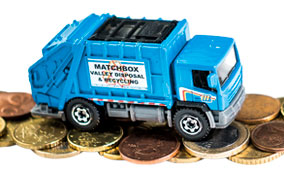Producer responsibility expanded to collection of consumer packaging

Transfer of the responsibility for the collection of consumer packaging from the municipalities to producer organisations has created collection points known as Rinki eco take-back points, where consumers can take the board, glass, metal and plastic waste originating in consumer packaging.
“Under the Government Decree on Packaging and Packaging Waste (518/ 2014), which entered into force in summer 2014, producers must arrange at minimum of 1,850 collection points for consumer packaging. Of these collection points, 500 must have facilities to also take back plastic packaging waste. Besides this, producers must set up at least 30 terminals which accept packaging waste collected by municipalities and firms, and which is duly sorted in accordance with instructions issued,” explains Juha-Heikki Tanskanen, Rinki’s CEO.
Transfer of producer responsibility to producer organisations
In Finland, firms have main responsibility for arranging the recycling of packaging. They can transfer their producer responsibility to producer organisations in the packaging sector, who have in turn mandated Rinki to arrange the collection of consumer packaging on their behalf.
“Firms that have joined producer organisations through Rinki fulfil their producer obligation. They pay a recycling fee and Rinki and the producer organisations deal with these statutory matters for them. Around 4,200 firms have joined the scheme,” Tanskanen says.
Rinki deals with producer responsibility for packaging
“Rinki is a non-profit company owned by Finnish industry and the retail trade. Our job is to deal with producer responsibility for packaging as cost-efficiently as possible and one of our tasks is to arrange the collection of consumer packaging.”
Rinki has chosen the locations for all Rinki eco take-back points. Around 1,400 existing points already collected some packaging material earlier. These collection points were leased from municipal waste management authorities and partly also acquired for Rinki.
Recycling when doing the shopping
Some 450 completely new Rinki eco take-back points are being set up in conjunction with stores. This will make it easy for people to bring their used, sorted packaging for recycling when they do their shopping. In sparsely populated areas, collection points can be located in conjunction with shops and also in fire station yards or at traffic hubs, for example. Rinki is responsible for emptying the collection containers and for tidiness.
“Most of the recycling fees are spent on collecting and recycling consumer packaging. The collection containers and emptying them constitute the largest cost items. Emptying has been tendered and Finland is divided into 11 contract areas. Emptying the containers alone runs into several million euros a year,” Tanskanen says.
Municipalities might also have their own eco take-back points. They can also provide property-specific collection of packaging waste and they have the right to charge the properties for this service. Where producers or a municipality do not arrange a property-specific collection service, properties may also order this service from private waste management firms.
Rinki invoices and passes on recycling fees
“Rinki deals with compiling packaging statistics, invoices recycling fees from firms with producer responsibility and passes the fees on without deductions to the producer organisations. This is the easiest way for firms to comply with their statutory producer responsibility for packaging,” says Sari Hedayet, Financial Manager at Rinki.
The scheme operates on a one-stop-shop principle. Under one contract, a firm can transfer its producer responsibility to five different producer organisations, and packaging data can be declared once a year in just one report.
The producer organisations decide independently on the size of the fees charged to producers each year. Since more costs arise from consumer packaging than BtoB packaging, recycling fees for consumer packaging are higher.
Rising costs
The total costs of full producer responsibility in 2016 are more than €20 million. Costs have almost tripled in just a few years. This is because of building the collection system for consumer packaging required under the Waste Act and the Government Decree on Packaging and Packaging Waste,” Hedayet explains.
By tendering operations and by improving the efficiency of its own activities, Rinki has nevertheless managed to reduce its annual fee for 2016 by 14.5%.
Consumer packaging accounts for roughly one third of the entire volume of material subject to producer responsibility. According to Hedayet, the retail trade accounts for around 40% of the total costs of producer responsibility.
Fact box:
• In 2012, the new Waste Act expanded producer responsibility for packaging from part to full responsibility.
• In 2014, the Government Decree on Packaging and Packaging Waste allowed 18 months to set up a recycling network for consumer packaging.
Text Leena Koskenlaakso, photo Atte Lakinnoro